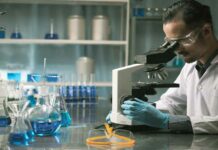Soybean meal is a bi-product following oil extraction from soybean seeds. It is rich in protein, which usually makes up around 40% of the nutritional components of the seeds and dependent on the line, and can also contain high oleic acid (a monounsaturated omega-9 fatty acid).
The study looked at the role soybeans could have in the prevention of cancer. Using a variety of soybean lines which were high in oleic acid and protein, the researchers looked to monitor bioactivity between the peptides derived from the meals of soybean and various types of human cancer cells.
The study showed that peptides derived from soybean meal significantly inhibited cell growth by 73% for colon cancer, 70% for liver cancer and 68% for lung cancer cells using human cell lines. This shows that the selected high oleic acid soybean lines could have a potential nutraceutical affect in helping to reduce the growth of several types of cancer cells.
This article is “Peptides derived from high oleic acid soybean meals inhibit colon, liver and lung cancer cell growth” by Srinivas J. Rayaprolu, Navam S. Hettiarachchy, Pengyin Chen, Arvind Kannan and Andronikos Mauromostakos




















